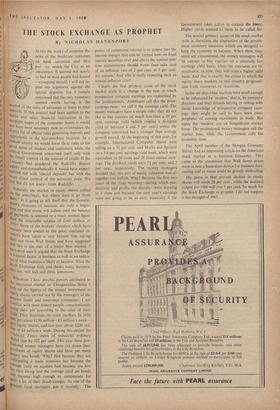THE STOCK EXCHANGE AS PROPHET
By NICHOLAS DAVENPORT ALTER the weeks of suspense the news of the moderate restraints power of compound interest is so potent that the interest margin that can be earned now on fixed interest securities over and above the normal pen- sion requirements should more than take care of an inflation rate of 2 per cent. to 3 per cent. per annum.' And who is really expecting such an annual inflation rate?
Clearly the first primary cause of the stock market cycle is a change in the rate at which prospective company earnings are capitalised by the 'professionals.' Americans call this the price- earnings ratio: we call it the earnings yield. The money managers have a simple rule: they do not like to buy equities on much less than a 10 per cent. earnings yield (which implies a dividend yield of between 4 and 5 per cent.) unless the company concerned has a stronger than average growth record. At the beginning of this year, for example, International Computer shares were selling on a 51 per cent. and Marks and Spencer on a 3.6 per cent. earnings yield basis, which were equivalent to 18 times and 28 times annual earn- ings. The dividend yields were 21 per cent. and 2 per cent. respectively. The money managers decided that this sort of equity valuation was al- together too bullish. Why? Because the first two years of the trade recovery—during which pro- ductivity and profits rise sharply—were drawing to a close and because the next year's earnings were not going to be so easy, especially if the Government takes action to contain the boom. Higher yields seemed to them to be called for.
The second primary cause of the stock market cycle is, therefore, the alternation of the govern- ment monetary measures which are designed to keep the economy in balance. When these mea- sures are expansionist, the money managers will be content to buy equities on a relatively low earnings yield basis; when the measures are re- strictionist, as now, they will want a higher yield basis. And that is exactly the extent to which the equity share markets in this country prognosti- cate trade recoveries or recessions.
In the old days when markets were small enough to be influenced by 'insiders,' that is, by company directors and their friends buying or selling with inside knowledge of prospective company earn- ings, they might be said to have been more prophetic of coming movements in trade. But today the 'insiders' are an insignificant market force The professional money managers call the market tune, while the Government calls the economic tune.
The April number of the Morgan Guaranty Survey had an interesting article on the American stock market as a business forecaster. They came to the conclusion that Wall Street prices were at best a hazardous device for business fore- casting and at worse could be grossly misleading.
My guess is that present decline in equity shares will reach 20 per cent., while the national output for 1960 will rise 5 per cent. So much for the Stock Exchange as prophet. I do not suppose it has thought of 1961.






































 Previous page
Previous page